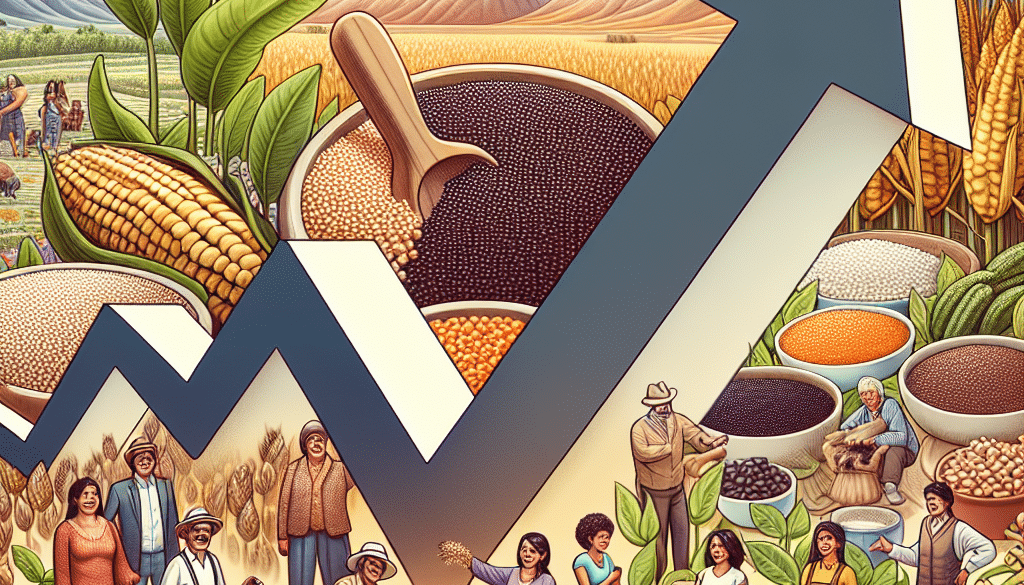The Rise of Plant Proteins in Latin America
-
Table of Contents
- Plant Proteins Gain Ground in Latin America’s Food Industry
- The Drivers of Plant Protein Popularity in Latin America
- Emerging Markets and Innovations
- Case Studies: Success Stories in Plant Proteins
- Statistics: The Numbers Behind the Trend
- Challenges and Opportunities
- Conclusion: A Protein Revolution in the Making
- ETChem: Your Partner for High-Quality Protein Products
Plant Proteins Gain Ground in Latin America’s Food Industry
The global shift towards plant-based diets has been gaining momentum, and Latin America is no exception. With a rich agricultural heritage and a growing awareness of health and environmental concerns, the region is seeing a significant rise in the consumption and production of plant proteins. This article delves into the factors driving this trend, the key players, and the potential impact on the food industry and beyond.
The Drivers of Plant Protein Popularity in Latin America
Several factors contribute to the increasing popularity of plant proteins in Latin America:
- Health Awareness: As obesity and chronic diseases rise, more Latin Americans are seeking healthier dietary options, including plant-based proteins.
- Environmental Concerns: The environmental impact of meat production is well-documented, leading consumers to consider the more sustainable option of plant proteins.
- Economic Factors: Plant proteins can be more cost-effective than animal proteins, making them an attractive option for both consumers and manufacturers.
- Cultural Shifts: Global trends and the influence of social media have introduced plant-based diets to a wider audience in the region.
Emerging Markets and Innovations
Latin America’s plant protein market is not only growing but also innovating. Countries like Brazil, Mexico, and Argentina are at the forefront of this movement, with startups and established companies alike introducing new plant-based products. For example, the Brazilian company Fazenda Futuro has made headlines with its plant-based burgers, while in Mexico, companies like Heartbest Foods are offering dairy alternatives made from peas and amaranth.
Case Studies: Success Stories in Plant Proteins
Several case studies highlight the success of plant proteins in Latin America:
- Fazenda Futuro: This Brazilian startup has quickly become a leader in plant-based meats, securing significant investment and expanding its product range.
- NotCo: Chilean-based NotCo uses artificial intelligence to create plant-based alternatives to dairy and meat products, gaining international attention and investment.
- Frutyo: In Argentina, Frutyo is capitalizing on the country’s soy production to create a range of soy-based meat alternatives.
Statistics: The Numbers Behind the Trend
Statistical data underscores the rise of plant proteins in Latin America:
- Market research indicates that the Latin American plant-based protein market is expected to grow at a CAGR of over 5% between 2020 and 2025.
- Brazil, the largest economy in the region, has seen a 40% increase in vegetarians in the past decade, according to the Brazilian Vegetarian Society.
- In Mexico, the plant-based market is projected to reach $1.3 billion by 2025, as reported by Markets and Markets.
Challenges and Opportunities
While the rise of plant proteins in Latin America presents significant opportunities, there are also challenges to be addressed:
- Supply Chain: Developing a robust supply chain for plant-based ingredients is crucial for sustained growth.
- Consumer Education: Educating consumers about the benefits of plant proteins is essential for market expansion.
- Regulatory Environment: Clear regulations and standards will help ensure product quality and safety, fostering consumer trust.
Conclusion: A Protein Revolution in the Making
The rise of plant proteins in Latin America is more than a trend; it’s a revolution in the making. With health, environmental, and economic drivers at play, the region is poised to become a significant player in the global plant-based food industry. As Latin American consumers continue to embrace plant proteins, we can expect to see continued growth, innovation, and investment in this sector.
ETChem: Your Partner for High-Quality Protein Products
If you’re looking to capitalize on the plant protein trend in Latin America, ETChem’s protein products are an excellent choice. With a reputation for quality and reliability, ETChem offers a range of collagen products that cater to various industries. Whether you’re in nutraceuticals, pharmaceuticals, or food and beverage, ETChem can provide the protein solutions you need to succeed in this burgeoning market.
About ETChem:
ETChem, a reputable Chinese Collagen factory manufacturer and supplier, is renowned for producing, stocking, exporting, and delivering the highest quality collagens. They include marine collagen, fish collagen, bovine collagen, chicken collagen, type I collagen, type II collagen and type III collagen etc. Their offerings, characterized by a neutral taste, instant solubility attributes, cater to a diverse range of industries. They serve nutraceutical, pharmaceutical, cosmeceutical, veterinary, as well as food and beverage finished product distributors, traders, and manufacturers across Europe, USA, Canada, Australia, Thailand, Japan, Korea, Brazil, and Chile, among others.
ETChem specialization includes exporting and delivering tailor-made collagen powder and finished collagen nutritional supplements. Their extensive product range covers sectors like Food and Beverage, Sports Nutrition, Weight Management, Dietary Supplements, Health and Wellness Products, ensuring comprehensive solutions to meet all your protein needs.
As a trusted company by leading global food and beverage brands and Fortune 500 companies, ETChem reinforces China’s reputation in the global arena. For more information or to sample their products, please contact them and email karen(at)et-chem.com today.





